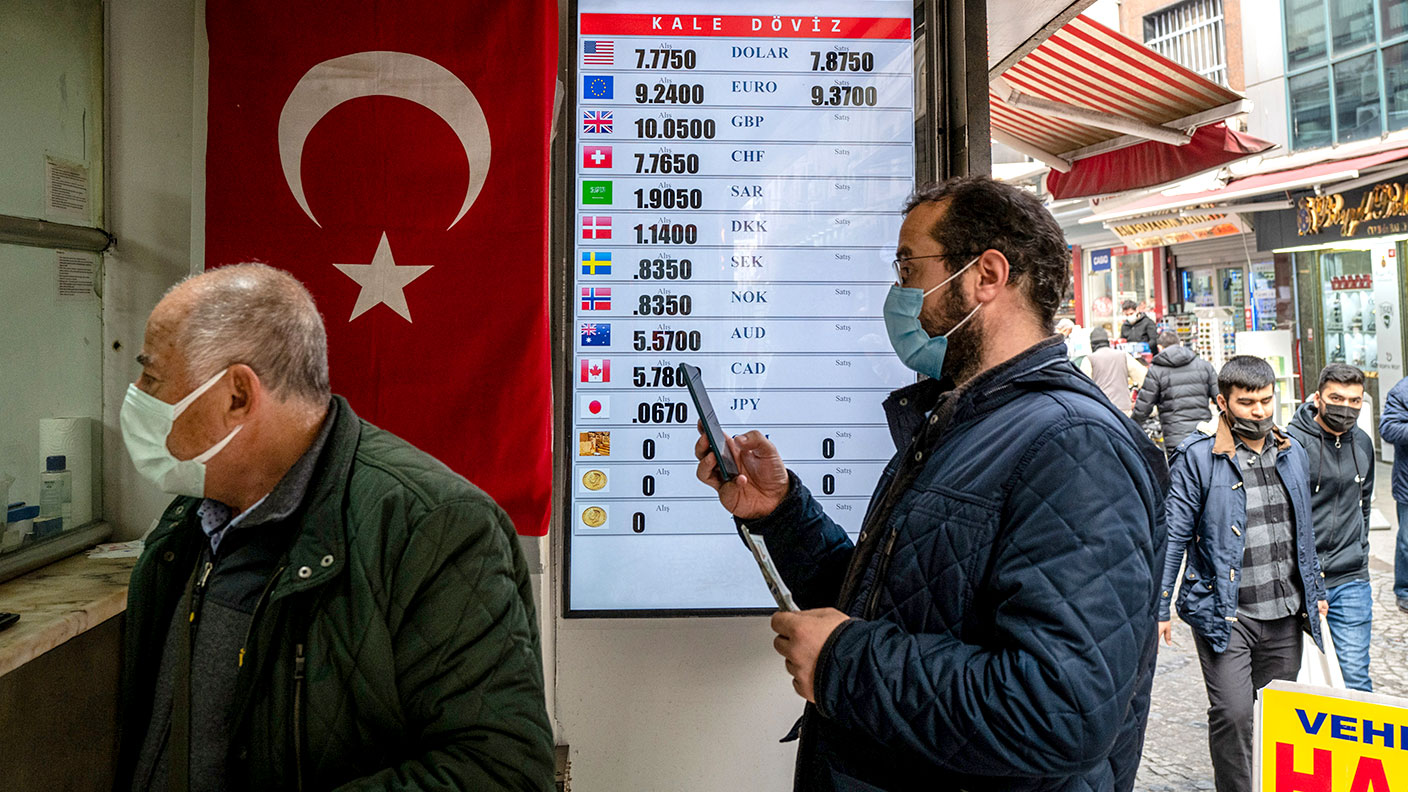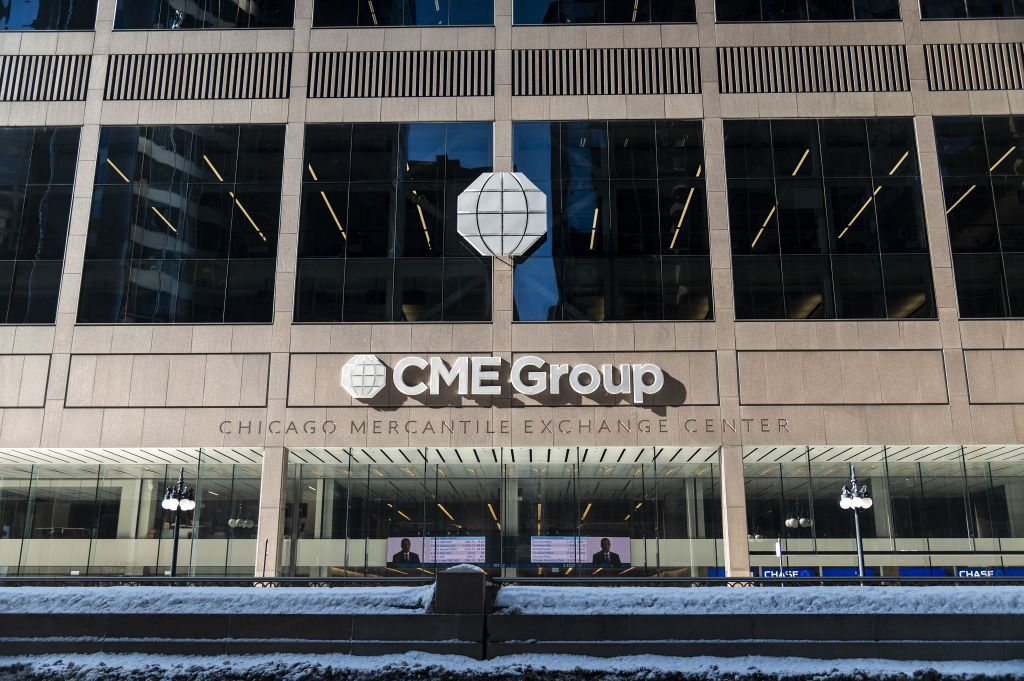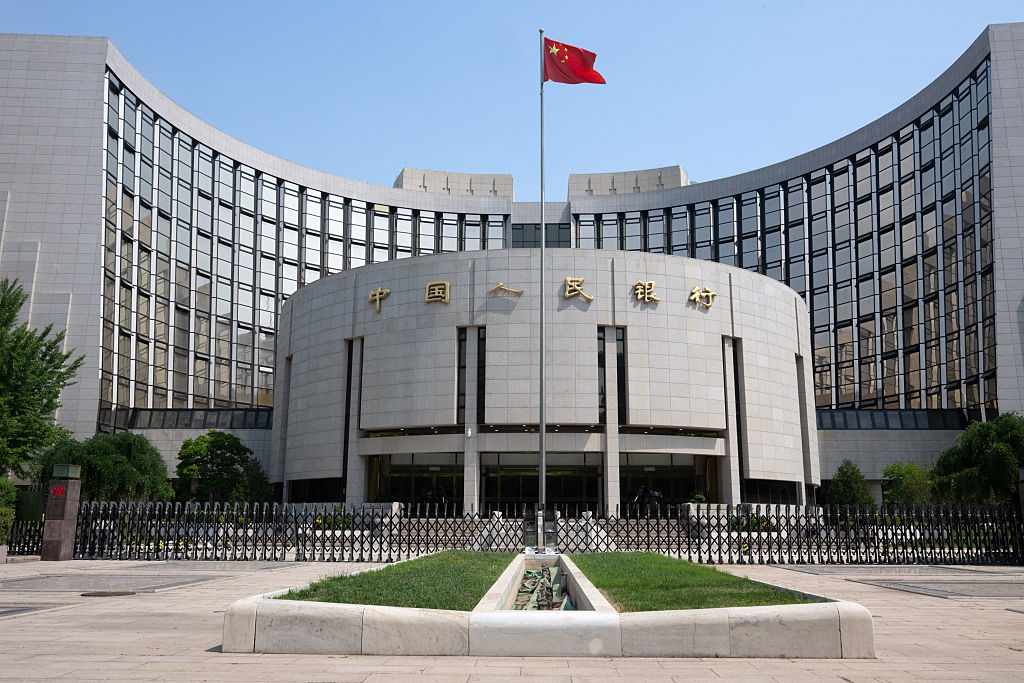The Turkish lira crashed this morning. What’s going on?
The Turkish lira crashed after President Recep Tayyip Erdogan sacked the country’s central bank governor. Saloni Sardana looks at what’s behind it all, and what it means for investors.


Get the latest financial news, insights and expert analysis from our award-winning MoneyWeek team, to help you understand what really matters when it comes to your finances.
You are now subscribed
Your newsletter sign-up was successful
Want to add more newsletters?

Twice daily
MoneyWeek
Get the latest financial news, insights and expert analysis from our award-winning MoneyWeek team, to help you understand what really matters when it comes to your finances.

Four times a week
Look After My Bills
Sign up to our free money-saving newsletter, filled with the latest news and expert advice to help you find the best tips and deals for managing your bills. Start saving today!
The Turkish lira crashed this morning – falling by as much as 15% against the US dollar at one point – after Turkish president Recep Tayyip Erdogan sacked the central bank governor, Naci Agbal, this weekend.
Last week, the lira had strengthened sharply after Agbal had increased Turkey’s key interest rate by two percentage points to 19%, more than economists had expected. Inflation in Turkey is running at above 15% a year.
Agbal’s move was designed to get ahead of the problem. However, it clearly went against the wishes of Erdogan, who promptly replaced him with Sahap Kavcioglu, a former member of the ruling party.
MoneyWeek
Subscribe to MoneyWeek today and get your first six magazine issues absolutely FREE

Sign up to Money Morning
Don't miss the latest investment and personal finances news, market analysis, plus money-saving tips with our free twice-daily newsletter
Don't miss the latest investment and personal finances news, market analysis, plus money-saving tips with our free twice-daily newsletter
What caused the slump?
Agbal has only been in the job since November, when he was appointed to help combat inflation. This shot up to eye-watering levels during the country’s debt crisis of 2018, which saw the lira slide by 34% against the dollar, driving up inflation beyond 25% at one point.
The two main drivers of the currency crash were Turkey’s high current account deficit (in other words, more money was going out of than coming into the country, leaving it reliant on foreign investment, which can be very short term) and high levels of private foreign-currency denominated debt (debt denominated in foreign currencies becomes harder to service the weaker the borrower’s currency becomes).
Since Agbal’s appointment as central bank chief, the lira had strengthened in value as both overseas and domestic investors preferred his traditional macroeconomic policies. And his latest rate hike had been applauded by both local and foreign investors as a credible move to tackle inflation.
Indeed, before Monday’s sharp sell-off, the Turkish lira had been one of the highest-flying emerging-market currencies so far this year, “owing in part to Agbal’s long-needed tightening of monetary policy and prudent decision making”, notes Sophie Griffiths, market analyst at OANDA.
However, the rate hike was too much to stomach for Erdogan, a long-time opponent of higher interest rates. Erdogan is of the – shall we say, unusual – opinion that higher interest rates cause inflation, rather than stifling it. Whether this belief is genuine or not, like most politicians, he prefers low interest rates because they tend to make borrowing cheaper and (nominal) growth faster, which tends to be more politically popular.
Thus he has appointed Kavcioglu, a professor of banking at Marmara University, as Agbal’s replacement for the top job. Kavcioglu is known to be more dovish in nature and shares Erdogan’s taste for lower interest rates, according to multiple reports.
Will there be a knock-on effect?
So will the lira’s plunge reverberate across other financial markets? Whenever these sorts of crises arise, investors’ memories tend to hark back to the Asian crisis of 1997, when a currency collapse in Thailand saw a domino effect take hold across the region.
However, so far the risks of “contagion” look fairly small. Although Turkey’s foreign currency debt is eye-watering at $430bn, currently worth 59% of the country’s GDP, most of this money is owed to Turkish businesses and households, notes Udith Sikand, analyst at Gavekal Research. “This gives Ankara considerable room for can-kicking, for example by issuing foreign currency bonds to domestic depositors”, adds Sikand.
This means that for now Turkey can avoid having to introduce capital controls to prevent foreign currency outflows, a scenario which would have prevented foreign banks and businesses from withdrawing their cash – and probably sparked a panic.
The situation is also nowhere near as bad as in 2018, when the European Central Bank warned banks who had exposure to the country about the risk of contagion spreading to other financial markets. Even though Spanish, Italian, French and German banks still have exposure worth $118bn to Turkey, “the European banking sector is not looking too troubled, at least by Turkey, as markets look for improved growth, lower loan losses and steeper yield curves to fatten their profits and increase their ability to pay dividends”, says Russ Mould, investment director at AJ Bell.
So while Turkish assets and the currency are likely to struggle under the new dovish governor – which will only exacerbate Turkey’s inflation problem, as Jason Tuvey, senior emerging markets economist at Capital Economics points out, it doesn’t yet look like this will cause major problems elsewhere.
What does this mean for my money?
Unless you have heavy exposure to Turkish assets (in which case you’ve already been through the mill several times over the last few years), there is no obvious reason to make big changes to your portfolio.
Even on the bond market front, Turkey is not a core holding for most emerging debt funds, says Sikand, pointing out that Turkey represents only a 3.5% weighting in the JP Morgan EMBI Global Diversified Index, a benchmark and total return index for $250bn worth of sovereign debt holdings.
Get the latest financial news, insights and expert analysis from our award-winning MoneyWeek team, to help you understand what really matters when it comes to your finances.
Saloni is a web writer for MoneyWeek focusing on personal finance and global financial markets. Her work has appeared in FTAdviser (part of the Financial Times), Business Insider and City A.M, among other publications. She holds a masters in international journalism from City, University of London.
Follow her on Twitter at @sardana_saloni
-
 Should you buy an active ETF?
Should you buy an active ETF?ETFs are often mischaracterised as passive products, but they can be a convenient way to add active management to your portfolio
-
 Power up your pension before 5 April – easy ways to save before the tax year end
Power up your pension before 5 April – easy ways to save before the tax year endWith the end of the tax year looming, pension savers currently have a window to review and maximise what’s going into their retirement funds – we look at how
-
 Should you sell your Affirm stock?
Should you sell your Affirm stock?Affirm, a buy-now-pay-later lender, is vulnerable to a downturn. Investors are losing their enthusiasm, says Matthew Partridge
-
 Profit from pest control with Rentokil Initial
Profit from pest control with Rentokil InitialRentokil Initial is set for global expansion and offers strong sales growth
-
 In the money: how my trading tips fared in 2025
In the money: how my trading tips fared in 2025The success of the open positions offset losses on closed ones, says Matthew Partridge
-
 Coreweave is on borrowed time
Coreweave is on borrowed timeAI infrastructure firm Coreweave is heading for trouble and is absurdly pricey, says Matthew Partridge
-
 Circle sets a new gold standard for cryptocurrencies
Circle sets a new gold standard for cryptocurrenciesCryptocurrencies have existed in a kind of financial Wild West. No longer – they are entering the mainstream, and US-listed Circle is ideally placed to benefit
-
 Profit from other investors’ trades with CME Group
Profit from other investors’ trades with CME GroupCME Group is one of the world’s largest exchanges, which gives it a significant competitive advantage
-
 Investors need to get ready for an age of uncertainty and upheaval
Investors need to get ready for an age of uncertainty and upheavalTectonic geopolitical and economic shifts are underway. Investors need to consider a range of tools when positioning portfolios to accommodate these changes
-
 How much gold does China have – and how to cash in
How much gold does China have – and how to cash inChina's gold reserves are vastly understated, says Dominic Frisby. So hold gold, overbought or not
